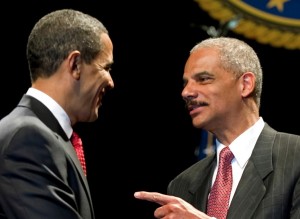by Tanya K. Metaksa
The headline in the July 29, 2014 Washington Times article announced, “Gun retailers, payday lenders out of Choke Points crosshairs.” The article goes on to say that “Gun retailers are no longer on a hit list deemed ‘high risk’ by the Federal Deposit Insurance Corp (FDIC).”
“What?” you say? “I didn’t know there was a ‘high risk’ hit list that included gun retailers.” You are not alone. Many, many gunowners have never heard of Operation Choke Point and until recently very few Americans knew of its existence.
Yet the FDIC, which insures the banking industry, has been counseling banking institutions on dealing with businesses that are “high risk” since 2011. The FDIC has made it abundantly clear that banks’ clients who are in those “high risk” businesses— porn stores, payday lenders, dating services, coin dealers, sellers of drug paraphernalia, gambling, adult film purveyors, and firearms retailers— should be carefully scrutinized.
Then, in a speech in March 2013 Michael J. Bresnick, executive director of President Obama’s Financial Fraud Enforcement Task Force,—“a task force that was created in 2009…to protect the American public from…financial fraud”—stated that the Department of Justice (DOJ) was “focused on financial institutions and payment processors because they are the so-called bottlenecks, or choke-points,” in financial fraud.
Whatever one thinks about the businesses targeted, it is obvious there is an anti-freedom bias in the Obama administration. For the government to prejudge the credit worthiness of a corporation or individual based on their choice of business, stretches regulatory power to the limit. Former FDIC Chaiman William M. Isaac said it is “a direct assault on the democratic system and free-market economy.” Documents obtained by the House Oversight Committee indicate the close cooperation between DOJ and other federal agencies such as the Federal Trade Commission, the Federal Reserve Bank of Atlanta, and the FDIC. This excessive scrutiny caused many banks to become convinced that having “high risk” businesses as clients was not worth the risk.
If anyone has been affected by Operation Choke Point, the National Shooting Sports Foundations would like you to answer a short online survey. It may be found at http://www.nssf.org/share/surveys.
Several firearms businesses were featured in a May 18 Washington Times article entitled, “‘High risk’ label from feds puts gun sellers in banks’ crosshairs, hurts business.” Bank United, N.A. dropped Miami Florida Top Gun Firearms Training & Supply which had a sizeable online business.
This put a halt to all their online credit card processing. In Henderson, NV, Black Rifle Armory had accounts frozen, while Bank of America in Arizona singled out American Spirit Arms and McMillan Group International.
Kelly McMillan, director of operations of McMillan Group International, a firearms manufacturer and dealer, met on March 2012 with a Senior VP of Bank of America (BofA). He was told to take his business elsewhere because he was a firearms manufacturer. When he went public with the information, BofA characterized the problem as a misunderstanding, but McMillan responded by saying there was no misunderstanding, BofA did not want his business. McMillan has since moved his business to National Bank of Arizona, sold his rifle manufacturing business, and started a new credit card processing business under the name McMillan Merchant Solutions (mmsllc.com).
On the website, Kelly McMillan explains why he started his credit card processing business: “People around the country…telling me stories of similar situations that have happened to me…I set out on a mission to find a pro-gun pro-Second Amendment processor that was willing to partner with me in order to bring a solid financial partner to the industry so that everybody could get their credit card processing done without fear of having it pulled out from under them at any time in the future.” Just recently House Oversight Committee Chairman Darrel Issa (RCA), in a speech at Cato Institute, stated, “They call up the bank and say, ‘I see that you’ve got several gun shops— we’re very concerned.’ That phone call will get those companies dropped.” Now after two Congressional committees have been investigating Operation Choke Point, one of the government agencies, the FDIC, has decided to abandon its list of “high risk” businesses. Why? One may ask.
Rob Blackwell writing in the American Banker (July 28, 2014) surmises that “The FDIC is trying to take itself off the front lines” and that it is “hoping it can put daylight between itself and the Justice Department.” However, Blackwell goes on to say that it is unlikely that the pressure on banks will diminish overnight.
Rep. Blaine Luekemeyer (R-MO) has introduced H.R. 4986, a bill to end Operation Choke Point.,The bill has had a hearing by the Subcommittee on Financial Institutions and Consumer Credit, but is still awaiting action in the House. If the bill should pass the House, there is no guarantee it would even be considered in the Senate.
Too much scrutiny appears to have forced the FDIC to withdraw its list of “high risk” businesses, but the Obama DOJ is still around and we can only guess what new anti-gun schemes Attorney General Eric Holder is concocting. Choking the ability of firearms businesses to participate in the marketplace by denying credit and banking service is certainly a good way to destroy the Second Amendment.
President Obama has asked his Cabinet for “creative” ways he can use executive power—Choke Point is certainly creative—and we have two more years to witness more creativity in destroying the Second Amendment.




